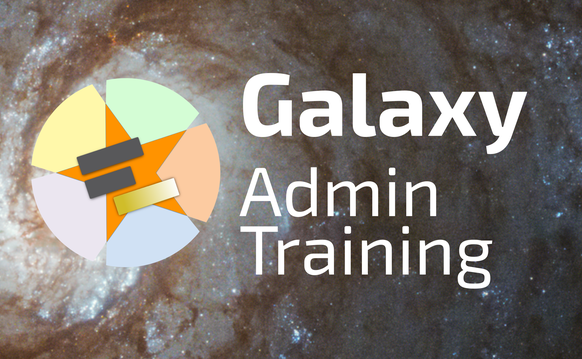2023 Galaxy Admin Training (Ghent)
In-person course
The ins and outs of setting up your own production quality Galaxy server
This workshop will cover basic and advanced topics you need to know to set up your own production, high-performance and multi-user Galaxy instance. Sessions will be intensive and hands-on, and taught by experienced instructors from the Galaxy Community. Participants will learn how to install, configure, customize, and extend their own Galaxy servers. Topics include tool configuration, authentication and user management, using heterogeneous storage and compute services, and many other topics that will enable you to get your own Galaxy server up and running, performing well, and used by your community.
Galaxy is an open web based platform for data integration and analysis. It is deployed at large and small organizations around the world and used in a broad range of research domains.
Schedule
Please see the Program tab
Prerequisites
Please review the prerequisites carefully before registering. If you arrive without meeting the prerequisites then the workshop will be a frustrating experience.
Comfortable with the Unix/Linux command line
Most of the workshop will happen at the Linux command line. If you aren’t comfortable with this before you arrive, then you will be lost the entire time. How comfortable do you need to be? Here’s a sampling of commands and concepts that you should be comfortable with:
cd, mkdir, rmdir, ls
tar, gzip
cp, mv, rm, chmod, ln
~, .., ./, /tmp,
cat, tail, less
man
Note: This is not an exhaustive list (or even a proper subset) of the commands that will be used in the workshop. They are included here to give you an idea of the depth of knowledge that is required.
We have a few tutorials that can help you get refreshed if you need:
Competent in a Unix/Linux text editor
Linux has several text editors available in it. You’ll need to be comfortable in at least one of them before the workshop starts. Organizers will make sure that these editors are available on the Linux images we use in the workshop:
We recommend that you use Nano, if you don’t know another text editor. It’s simple and easy to use. If you know another editor like Emacs or VIM you are of course welcome to use those as well.
Some experience with Linux Package Management
You don’t need to be an expert at Linux package management, but you do need to have some experience at installing and upgrading packages on a Linux system.
We’ll be using Ubuntu based images during the workshop, which means we’ll be using apt to do package management. Get to know it.
Prerequisites include all of the Introduction Session prerequisites, plus familiarity with the topics presented in that session.
Laptop Requirements
All participants should bring a wifi-enabled laptop with
- (Optional but useful) Software to access the command line of a Linux server.
- If you are running Linux or Mac OS, then you already have this.
- If you are running Windows than you’ll need to get something like putty installed before the workshop.
- A recent version of either the Firefox or Chrome web browser installed.
Registration
Please apply via our form. We only have limited space so please register as soon as possible. If you would like to attend but have funding problems we can support up to 3 people from Low and Middle Income Countries. Please indicate this in the form or contact us directly.
Please feel free to contact us at contact@usegalaxy.eu if you have any question and check this site for any updates.
Logistics
Venue and Accommodation
The Admin training will be held at: Monasterium PoortAckere - 56 Oude Houtlei, Ghent 9000, Belgium (map) The venue is in the city centre of Ghent and within walking distance of several historical attractions. The Monasterium PoortAckere is also a hotel. Participants can make their reservations by filling up the hotel’s reservation form and sending it to reservations@historichotelsbelgium.com. The hotel should then confirm the reservation. We have been advised that reservations made using this route can be cancelled free of charge up to 2 weeks before arrival.
Getting to Ghent
By train
The city of Ghent has a page on the subject here. The main station in Ghent is Gent-Sint-Pieters (map). The Belgian railway system is well connected with the European railway system. Transfers are often at Bruxelles-Midi/Brussel-Zuid/Brussels-South, Antwerp, or Lille (France).
The national railway company (SNCB/NMBS) offers an international route planner here.
To reach the venue from Gent-Sint-Pieters station, one can take tram line 1 or 2 towards the city centre. The city of Ghent offers information on public transport here. Taxis are also available right outside of Gent-Sint-Pieters station.
By plane
The city of Ghent has a page on the subject here.
The two main airports are Brussels Airport - BRU (a.k.a. Luchthaven Zaventem, Luchthaven Brussel-Nationaal, Brussel-Nationale Luchthaven, Aéroport de Bruxelles-National) and Brussels South Charleroi Airport - CRL. From Brussels Airport (BRU) it is convenient to take the train. There is a railway station beneath the airport. There, one can take the train to the Gent-Sint-Pieters station. The national railway company (SNCB/NMBS) offers a route planner.
From Brussels South Charleroi Airport (CRL), there is a shuttle bus service operated by Flibco. Route planner here. To reach the venue from Gent-Sint-Pieters station, one can take tram line 1 or 2 towards the city centre. The city of Ghent offers information on public transport here. Taxis are also available right outside of Gent-Sint-Pieters station.
By car
The city of Ghent has a page on the subject here. Be aware that the venue is inside Ghent’s Low Emission Zone (LEZ). You will likely need to register your car before being able to enter the LEZ (info here). The LEZ is enforced with smart cameras and failing to register the vehicle can lead to a fine of €150 per violation. Be aware that parking in Ghent can be cumbersome and expensive. Please check the venue’s page and the city of Ghent page on parking for the available options.
Who is this course for?
Galaxy administrators, or anyone interested in running a Galaxy server
Event Location
Geocoding via Nominatim, Map data from OpenStreetMap
Organisers & Instructors
This event is brought to you by:
| Organiser(s) |
|
| Instructor(s) |
|
| Infrastructure |
|



Before you start
Before starting the course, make sure to follow the setup instructions
Monday: Setting up Galaxy with Ansible
This day covers getting a Galaxy server setup with Ansible, a server you will develop for the rest of the week.
| Time | Lesson | Slides | Hands-on | Recordings |
|---|---|---|---|---|
09:00 - 09:30 |
Registration |
|||
09:30 - 10:00 |
Welcome and Introduction |
|||
|
Galaxy from an administrator's point of view
|
||||
| Ansible | ||||
11:30 - 11:45 |
Break |
|||
| Galaxy Installation with Ansible | ||||
13:00 - 14:00 |
Lunch |
|||
15:00 - 15:30 |
Break |
|||
| Server Maintenance: Cleanup, Backup, and Restoration | ||||
|
Advanced customisation of a Galaxy instance
|
||||
17:00 |
Wrap Up and Close |
|||
Tuesday: Making the server useful
Today we pivot to focus on making that server useful: adding tools and data, configuring quotas, etc.
| Time | Lesson | Slides | Hands-on | Recordings |
|---|---|---|---|---|
09:30 - 10:00 |
Welcome and Recap |
|||
|
Performant Uploads with TUS
|
||||
|
Reference Data with Data Managers
|
||||
| Reference Data with CVMFS | ||||
11:30 - 11:45 |
Break |
|||
| Use Apptainer containers for running Galaxy jobs | ||||
| Galaxy Tool Management with Ephemeris | ||||
13:00 - 14:00 |
Lunch |
|||
| Data Libraries | ||||
15:00 - 15:30 |
Break |
|||
15:00 - 15:30 |
Break |
|||
|
Scripting Galaxy using the API and BioBlend
|
||||
17:00 |
Wrap Up and Close |
|||
Wednesday: Clusters
Today we focus on connecting the Galaxy server to a compute cluster, and explore job configuration and TPV
| Time | Lesson | Slides | Hands-on | Recordings |
|---|---|---|---|---|
09:30 - 10:00 |
Welcome and Recap |
|||
|
User, Role, Group, Quota, and Authentication managment
|
||||
| Connecting Galaxy to a compute cluster | ||||
11:30 - 11:45 |
Break |
|||
| Mapping Jobs to Destinations using TPV | ||||
13:00 - 14:00 |
Lunch |
|||
| Running Jobs on Remote Resources with Pulsar | ||||
15:00 - 15:30 |
Break |
|||
17:00 |
Wrap Up and Close |
|||
Thursday: Expanding
Today we focus on running jobs on remote resources, then look into monitoring, data uploads, etc.
| Time | Lesson | Slides | Hands-on | Recordings |
|---|---|---|---|---|
09:30 - 10:00 |
Welcome and Recap |
|||
| Setting up Celery Workers for Galaxy | ||||
| Galaxy Monitoring with Reports | ||||
| Galaxy Monitoring with Telegraf and Grafana | ||||
11:30 - 11:45 |
Break |
|||
| Galaxy Monitoring with gxadmin | ||||
13:00 - 14:00 |
Lunch |
|||
| Training Infrastructure as a Service (TIaaS) | ||||
| Monitoring Galaxy and Pulsar with Sentry | ||||
15:00 - 15:30 |
Break |
|||
| Galaxy Interactive Tools | ||||
| Deploying a Beacon v1 in Galaxy | ||||
17:00 |
Wrap Up and Close |
|||
Friday
We made it! Today we have some additional topics, some of which are not admin related. Please feel free to leave at any point in the day and go enjoy Ghent if the topics are maybe a bit less interesting for you.
| Time | Lesson | Slides | Hands-on | Recordings |
|---|---|---|---|---|
09:30 - 10:00 |
Welcome and Recap |
|||
|
Galaxy Troubleshooting
|
||||
11:30 - 11:45 |
Break |
|||
|
Tool development and integration into Galaxy
|
||||
| Using dataset collections | ||||
| Rule Based Uploader | ||||
13:00 - 14:00 |
Lunch |
|||
|
Creating a new tutorial
|
||||
15:00 - 15:30 |
Break |
|||
17:00 |
Wrap Up and Close |
|||
Get set up for the course!
Follow the steps below to get set up with everything you need to participate in the course!

Prepare for the Course
Please review the prerequisites carefully before registering. If you arrive without meeting the prerequisites then the workshop will be a frustrating experience.
Comfortable with the Unix/Linux command line
Most of the workshop will happen at the Linux command line. If you aren’t comfortable with this before you arrive, then you will be lost the entire time. How comfortable do you need to be? Here’s a sampling of commands and concepts that you should be comfortable with:
cd, mkdir, rmdir, ls
tar, gzip
cp, mv, rm, chmod, ln
~, .., ./, /tmp,
cat, tail, less
man
Note: This is not an exhaustive list (or even a proper subset) of the commands that will be used in the workshop. They are included here to give you an idea of the depth of knowledge that is required.
We have a few tutorials that can help you get refreshed if you need:
Competent in a Unix/Linux text editor
Linux has several text editors available in it. You’ll need to be comfortable in at least one of them before the workshop starts. Organizers will make sure that these editors are available on the Linux images we use in the workshop:
We recommend that you use Nano, if you don’t know another text editor. It’s simple and easy to use. If you know another editor like Emacs or VIM you are of course welcome to use those as well.
Instructor Zone
Check out our checklists for
- Organising a Workshop to check that you haven't forgotten any important step.
- Running a Workshop, helpful reminders closer to your event.
Request TIaaS
Training Infrastructure as a Service (TIaaS) is a service that allows you to request space for your course on a server, it helps ensure courses run smoothly by separating your trainee's jobs into a separate queue. Learn more about TIaaS in our tutorial.
The following links will open a (mostly) pre-filled out TIaaS form,
Once you receive a URL from the admins, please set it as a tiaas_link in your event metadata.
Add your event to the Galaxy Hub Event Horizon
To also list your event on the Galaxy Event Horizon, copy the text below, and add your event to the Galaxy Hub GitHub Repo. Create a folder for your event here, and add an index.md file with the following contents:
---
title: "2023 Galaxy Admin Training (Ghent)"
date: '2023-04-17'
days: 5
tease: The ins and outs of setting up your own production quality Galaxy server
#continent: EU
location: "Monasterium PoortAckere,Ghent"
external_url: "https://training.galaxyproject.org/training-material/events/2023-04-17-gat-gent.html"
gtn: true
contact: "contact@usegalaxy.eu"
subsites: [all]
---
Promote the Event
Tootable/Tweetable version:
2023 Galaxy Admin Training (Ghent)! 📢
The ins and outs of setting up your own production quality Galaxy server
📅 April 17 – 21, 2023
➡️ https://gxy.io/GTN:E00002
📝 Registration is open until 2022-03-01! https://docs.google.com/forms/d/e/1FAIpQLSc3zgDTfcLZ2-92EdgJvfR4j0KxQeOv0tiFMzGXZ6hdW7JlwQ/viewform
Slack-compatible version:
2023 Galaxy Admin Training (Ghent)! 📢
The ins and outs of setting up your own production quality Galaxy server
:calendar: April 17 – 21, 2023
:arrow_right: https://gxy.io/GTN:E00002
:pencil: Registration is open until 2022-03-01! https://docs.google.com/forms/d/e/1FAIpQLSc3zgDTfcLZ2-92EdgJvfR4j0KxQeOv0tiFMzGXZ6hdW7JlwQ/viewform
Version with schedule:
2023 Galaxy Admin Training (Ghent)! 📢
The ins and outs of setting up your own production quality Galaxy server
**Agenda**:
- Monday: Setting up Galaxy with Ansible
- Tuesday: Making the server useful
- Wednesday: Clusters
- Thursday: Expanding
- Friday
📅 April 17 – 21, 2023
➡️ https://gxy.io/GTN:E00002
📝 Registration is open until 2022-03-01! https://docs.google.com/forms/d/e/1FAIpQLSc3zgDTfcLZ2-92EdgJvfR4j0KxQeOv0tiFMzGXZ6hdW7JlwQ/viewform
 Event is Over
Event is Over
Event details
| event-date | April 17 – 21, 2023 |
| event-location | Monasterium PoortAckere, Oude Houtlei 56, Ghent, Belgium, 9000 |
| event-cost | free |
| contact@usegalaxy.eu |
Add this event to your calendar Google Outlook Office 365
Organisers
Instructors
In collaboration with